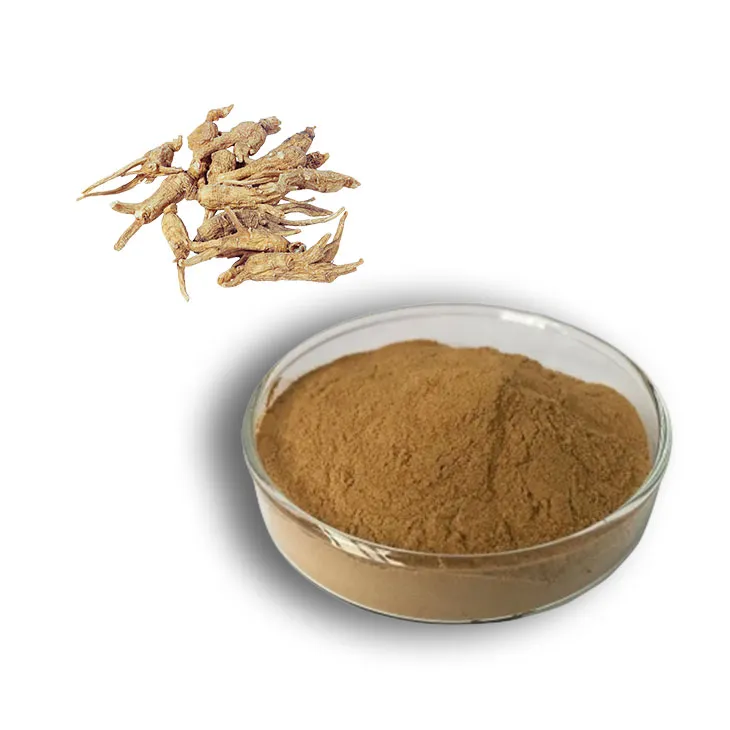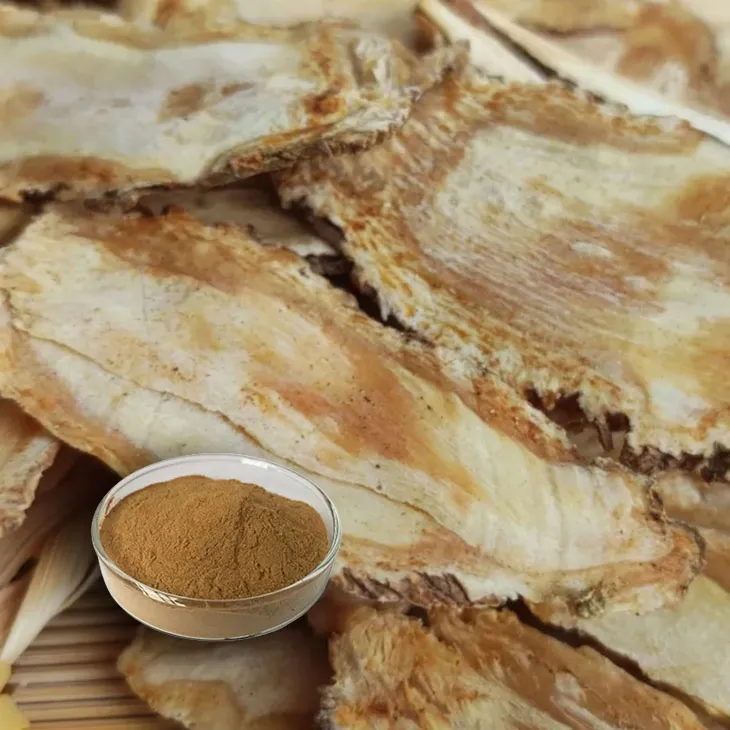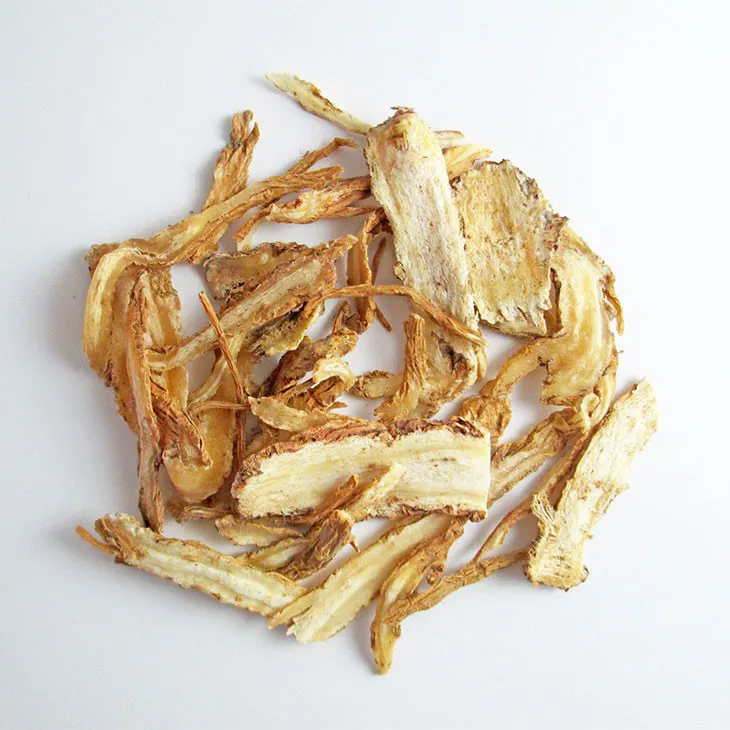- 0086-571-85302990
- sales@greenskybio.com
Best Types of Angelica Sinensis Extract: A Guide to Selecting the Best Angelica Sinensis Extract
2024-11-12

Introduction
Angelica Sinensis, also known as Dong Quai, is a well - known herb in traditional Chinese medicine. The extract of Angelica Sinensis has been used for various health benefits. However, with the increasing popularity of herbal supplements, it has become crucial to understand how to select the best Angelica sinensis extract. This article will explore different aspects such as potency, chemical composition, and specific uses to help you make an informed choice.

Potency of Angelica sinensis extract
1. Standardized Extracts
- Standardized extracts are often considered a reliable option when it comes to potency. These extracts are processed in a way that ensures a consistent level of active compounds. For example, a standardized Angelica sinensis extract may guarantee a certain percentage of ferulic acid, which is one of the important bioactive components in the herb.
- When looking at the label of a standardized extract, you should check for the concentration of key constituents. A higher concentration doesn't always mean better, but it gives you an idea of the potency. For instance, an extract with a 5% ferulic acid concentration may be suitable for general use, while a more concentrated one, say 10%, might be used for more specific or severe health conditions under the guidance of a healthcare professional.
- The type of solvent used in the extraction process can also affect the potency of the Angelica Sinensis extract. Ethanol - based extracts are common. Ethanol is a good solvent for extracting many of the lipophilic (fat - loving) compounds in Angelica Sinensis. These compounds may contribute to the overall potency of the extract in terms of its potential health benefits.
- However, different solvents may extract different sets of compounds. Some water - based extracts may also be available, and they might be more focused on hydrophilic (water - loving) components. The choice between solvent - based extracts depends on the specific compounds you are interested in for your desired health benefits.

Chemical Composition of Angelica Sinensis Extract
1. Ferulic Acid
- Ferulic acid is one of the major components in Angelica Sinensis extract. It has antioxidant properties. Antioxidants are important for protecting the body's cells from damage caused by free radicals. Free radicals are unstable molecules that can cause oxidative stress, which is linked to various diseases such as cancer, heart disease, and aging - related conditions.
- In addition to its antioxidant role, ferulic acid may also have anti - inflammatory effects. Inflammation is a natural response of the body, but chronic inflammation can be harmful. Ferulic acid may help in reducing inflammation in the body, which could potentially benefit conditions like arthritis.
- Ligustilide is another significant compound found in Angelica Sinensis. It has been studied for its potential effects on the cardiovascular system. Research suggests that ligustilide may help in reducing blood pressure. High blood pressure is a major risk factor for heart disease and stroke, so any natural compound that can contribute to blood pressure regulation is of great interest.
- Moreover, ligustilide may also play a role in improving blood circulation. Good blood circulation is essential for delivering oxygen and nutrients to all parts of the body. By enhancing blood circulation, ligustilide - containing Angelica Sinensis extract may be beneficial for overall health and may also help in alleviating conditions like cold hands and feet.
- Angelica Sinensis extract contains phytosterols. Phytosterols are plant - based compounds that are structurally similar to cholesterol in humans. They are known for their cholesterol - lowering effects. When consumed, phytosterols can compete with cholesterol for absorption in the intestines, thereby reducing the amount of cholesterol that is absorbed into the bloodstream.
- This cholesterol - lowering property of phytosterols in Angelica Sinensis extract can be beneficial for people with high cholesterol levels. It may also contribute to a reduced risk of heart disease, as high cholesterol is a significant risk factor for cardiovascular problems.

Uses of Angelica Sinensis Extract and How to Select Based on Them
1. Women's Health
- Angelica Sinensis has a long history of use in women's health. It is often used to regulate the menstrual cycle. For women with irregular periods, an Angelica Sinensis extract with a balanced chemical composition, including appropriate levels of ferulic acid and ligustilide, may be beneficial. Ferulic acid's anti - inflammatory properties may help in reducing menstrual cramps, while ligustilide's potential to improve blood circulation can ensure a proper blood supply to the reproductive organs during the menstrual cycle.
- During menopause, some women may experience symptoms such as hot flashes and mood swings. Angelica Sinensis extract may also be helpful in alleviating these symptoms. In this case, look for extracts that are standardized for a consistent level of active compounds. A high - quality extract may contain a good amount of phytosterols, which could potentially help in hormonal balance during menopause.
- Due to its antioxidant properties, Angelica Sinensis extract can be beneficial for skin health. The ferulic acid in the extract can help protect the skin from damage caused by environmental factors such as UV radiation and pollution. For skin - related uses, an extract with a relatively high concentration of ferulic acid may be preferred.
- Some people use Angelica Sinensis extract in skincare products. When choosing an extract for this purpose, it is important to ensure that it is pure and free from contaminants. Look for extracts that are produced using high - quality manufacturing processes, such as those that are GMP (Good Manufacturing Practice) - compliant.
- The various bioactive compounds in Angelica Sinensis extract, including its antioxidant and anti - inflammatory components, can contribute to immune system support. A well - balanced extract with a combination of ferulic acid, ligustilide, and phytosterols may help in strengthening the immune system.
- When selecting an Angelica Sinensis extract for immune system support, consider the overall quality of the product. Check for certifications, such as organic certifications if you prefer an organically - sourced extract. Organic extracts are often produced without the use of synthetic pesticides and fertilizers, which may be a healthier option for long - term use.
Quality Assurance and Certification
1. Organic Certification
- An organic certification for Angelica Sinensis extract indicates that the raw material (the Angelica Sinensis plant) was grown without the use of synthetic pesticides, fertilizers, or genetically modified organisms (GMOs). Organic extracts are often considered a more natural and environmentally - friendly option. They may also be preferred by those who are concerned about potential pesticide residues in non - organic products.
- When looking for an organically - certified Angelica Sinensis extract, make sure that the certification is from a reputable and recognized certifying body. Examples of well - known organic certifying bodies include the USDA (United States Department of Agriculture) in the United States and the EU Organic Certification in Europe.
- GMP (Good Manufacturing Practice) - certified facilities follow strict manufacturing guidelines. For Angelica Sinensis extract, a GMP - certified product ensures that the extraction, processing, and packaging are carried out in a clean, hygienic, and controlled environment. This helps to maintain the quality and purity of the extract.
- Products with GMP certification are more likely to be consistent in terms of potency and chemical composition. When choosing an Angelica Sinensis extract, look for the GMP logo or indication on the product label. This gives you confidence that the product has been produced to a high - quality standard.
Conclusion
Selecting the best Angelica Sinensis extract requires considering various factors such as potency, chemical composition, intended use, and quality assurance. By understanding these aspects, you can make a more informed decision when choosing an Angelica Sinensis extract that suits your specific health needs. Whether it is for women's health, skin health, or immune system support, a high - quality extract with the right combination of active compounds and proper certifications can offer potential health benefits.
FAQ:
What factors should be considered when choosing the best Angelica Sinensis extract?
When choosing the best Angelica Sinensis extract, several factors should be considered. Potency is important as it determines the strength and effectiveness of the extract. The chemical composition also plays a crucial role as different components may be responsible for different health benefits. Purity is another factor to consider, ensuring that the extract is free from contaminants. Additionally, the method of extraction can impact the quality of the extract. Look for extracts that are obtained through high - quality extraction methods to ensure maximum potency and purity.
How can one determine the potency of Angelica Sinensis extract?
Determining the potency of Angelica Sinensis extract can be challenging. One way is to look at the concentration of active ingredients in the extract. This can be determined through laboratory analysis. Another way is to look at the recommended dosage. A more potent extract may require a lower dosage to achieve the same effect. However, it is important to note that potency can also be affected by other factors such as the quality of the raw material and the extraction method.
What are the main chemical components in Angelica Sinensis extract?
The main chemical components in Angelica Sinensis extract include ferulic acid, ligustilide, and polysaccharides. Ferulic acid has antioxidant properties and may help protect against oxidative stress. Ligustilide has been shown to have anti - inflammatory and analgesic effects. Polysaccharides may have immunomodulatory effects and can help boost the immune system.
How does the chemical composition of Angelica Sinensis extract relate to its uses?
The chemical composition of Angelica Sinensis extract is closely related to its uses. For example, the antioxidant properties of ferulic acid may make the extract useful in preventing or treating diseases associated with oxidative stress, such as cardiovascular diseases. The anti - inflammatory and analgesic effects of ligustilide may make the extract beneficial for relieving pain and inflammation. The immunomodulatory effects of polysaccharides may help in enhancing the immune system and fighting off infections.
Are there any side effects associated with Angelica Sinensis extract?
While Angelica Sinensis extract is generally considered safe, there may be some side effects associated with its use. Some people may experience allergic reactions, especially those with a history of allergies to plants in the Apiaceae family. High doses of the extract may also cause gastrointestinal problems such as nausea, vomiting, and diarrhea. It is important to follow the recommended dosage and consult a healthcare professional before using the extract, especially if you have underlying health conditions or are taking other medications.
Related literature
- The Chemical Constituents and Pharmacological Activities of Angelica Sinensis"
- "Potency and Quality Assessment of Herbal Extracts: A Case Study of Angelica Sinensis"
- "Angelica Sinensis Extract: From Traditional Use to Modern Applications"
- ▶ Hesperidin
- ▶ citrus bioflavonoids
- ▶ plant extract
- ▶ lycopene
- ▶ Diosmin
- ▶ Grape seed extract
- ▶ Sea buckthorn Juice Powder
- ▶ Beetroot powder
- ▶ Hops Extract
- ▶ Artichoke Extract
- ▶ Reishi mushroom extract
- ▶ Astaxanthin
- ▶ Green Tea Extract
- ▶ Curcumin Extract
- ▶ Horse Chestnut Extract
- ▶ Other Problems
- ▶ Boswellia Serrata Extract
- ▶ Resveratrol Extract
- ▶ Marigold Extract
- ▶ Grape Leaf Extract
- ▶ blog3
- ▶ blog4
- ▶ blog5
-
Organic Tongkat Ali extract powder factory.
2024-11-12
-
How to make powder with ashwagandha extract.
2024-11-12
-
Rosehip extract manufacturers from China.
2024-11-12
-
The best cat's claw extract in nature.
2024-11-12
-
Chinese Dandelion Leaf Extract Suppliers.
2024-11-12
-
Passionflower Extract
2024-11-12
-
Purple Sweet Potato Extract
2024-11-12
-
Polygonum Cuspidatum Extract
2024-11-12
-
Red Wine Extract
2024-11-12
-
Saffron Extract Powder
2024-11-12
-
Licorice Root Extract Powder
2024-11-12
-
Grape Seed Extract
2024-11-12
-
Eucommia Ulmoides Extract
2024-11-12
-
Golden Seal Extract
2024-11-12
-
Lily extract
2024-11-12





















